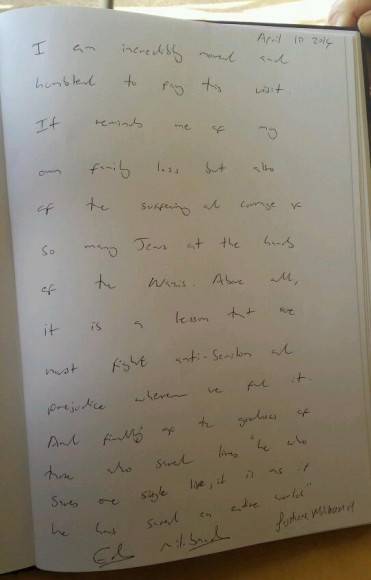
Ed Miliband, the leader of the Labour Party in Britain who wants to be Prime Minister, is on a trip to Israel that many see as a political pre-requisite to 10 Downing Street. During his first two days of travel, Miliband has been proclaiming his Jewish roots and pro-Israel cred.
The Financial Times notes the political needs he is serving:
Conservatives say lack of foreign experience is a serious failing in an aspiring prime minister
The trip has been following a predictable pattern. Miliband visited Sderot to meet people who are subject to rocket attacks from Gaza. Notice that several tweets ask why Miliband isn’t visiting people under occupation in Gaza.

Miliband also visited Yad Vashem and spoke of his grandmother emigrating to Israel.
But he was more critical of the settlements than any American pol could be. The Guardian reports:
“I do believe the growth in settlements is a serious issue for the peace process and needs to be addressed,” he said, adding that they were illegal under international law.
The Guardian says that at Hebrew University, he ducked the Zionism issue.
He refused to be drawn on whether he considered himself a Zionist, despite the question being asked three times during an hour-long question and answer session.
Though this statement is pretty Zionistic:
“For me, Israel is the homeland for the Jewish people, and the reason I put it in those terms is because it is not just a theoretical idea for me, it’s my family’s experience.”
Miliband’s note at Yad Vashem cites his family’s loss in the Holocaust, but thankfully not a word about Israel.

The trip was announced in February, and Britain’s Jewish Chronicle noted the political angle:
The trip is scheduled to be one of the Opposition leader’s first major foreign trips and will come a year before the General Election.
Then last month, Miliband was the keynote speaker for a group that combats anti-Semitism in England; he emphasized his support for Israel and affirmed his Jewish identity:
He told guests at the Community Security Trust’s annual dinner on Wednesday: “I feel more part of the Jewish community than at any other time in my life”.
The Labour leader also emphasised the importance of supporting Israel and recalled how the country “provided sanctuary” to his grandmother after the Holocaust.
Miliband is from an assimilated family and is married to a non-Jew (who signed his note at Yad Vashem). He began publicly embracing his Judaism a couple of years back, and included Woody Allen and Israel in that identity:
When I was seven, my family went to visit my grandmother in Tel Aviv…
My parents defined themselves not by their Jewishness but by their politics. They assimilated into British life outside the Jewish community. There was no bar mitzvah, no Jewish youth group; sometimes I feel I missed out.
And yet, I did not miss out on many other aspects of Jewishness: my mum got me into Woody Allen; my dad taught me Yiddish phrases (there is no better language for idiomatic expressions, some of them unrepeatable). And my grandmother cooked me chicken soup and matzo balls.
Although my wife Justine is not Jewish, my Jewishness is part of me, so when we got married last year, we broke a glass at our wedding, an old Jewish ritual.
We’re just on day 2 of the visit. Count on Miliband to visit Ramallah and East Jerusalem and issue some anodyne statements about Palestinian aspirations.
(And who will put Miliband’s visit together with former Australian Foreign Minister Bob Carr’s statements about the political importance of the Israel lobby?)


Phil, I understand and respect your intentions here, but how is this different than any of the usual pandering politicians do to various interest groups?
Sure, this is a site about the Middle East but these kind of routine pandering trips are not on the same playing field as Bob Carr’s relevations.
If anything, the Jewish community(and by “community” I really mean the same hard-right organizations like BICOM, the JCC etc that are dominating in the UK like AIPAC, AJC and the ADL are in America. In short: not representative) in the UK has been critical of Miliband.
Cameron is widely seen as more “pro-Israel” than Miliband. And Cameron talked about Gaza as an “open-air prison camp” a few years ago.
Which tells you a little bit about how the UK is oceans apart from America in how far they’ve come on this issue. Even the current ambassador to Israel, who is a conservative Jew, has admitted that Israel is losing even the centrist backbenchers.
P.S.
Here’s King’s College, part of the University of London system, passing a pro-BDS resolution in the student senate.
http://www.thejc.com/news/uk-news/116923/kings-college-londons-student-union-votes-israel-boycott
Just a few weeks ago. Other than Berkeley, I don’t know of any major university in US that’s among the Ivies that has passed one. And Berkeley is super liberal.
King’s a college with a strong business and economics department, not the usual profile of radical Marxists, to put it gently.
Phil, I appreciate the report that he was asked three times if he is a Zionist and that he declined to answer each time. It seems to me 1) that this is both a reasonable and an increasingly important question to ask politicians in the US, UK, EU, Australia, etc., and 2) that there is a taboo in effect that permits Zionists to avoid having to go on the record. The question was asked in Israel, but an answer might have pinned him down back home in ways that Barbara Boxer, Diane Feinstein, and numerous other successful politicians (and Supreme Court Justices) are not. I suggest that one of your sub-goals in the war of ideas in the middle east should be to allow and encourage discourse, including direct and frank cross-examination by the press of politicians, on the dual questions: are you a Zionist? And, if so, what does that mean to you (ideologically, emotionally, and/or with respect to whatever specific issues come up).
The suppression of such discourse is antithetical to US democracy. And if there are Anti-Semites out there who will feast on the news, let them: it is neither an excuse to suppress relevant political inquiry, nor effective in quelling Anti-Semitism to misuse law and policy in an attempt to control thought. Such is the cost of power in America, and an often-effective check on uncontrolled power.
If Adelson buys the White House for Israel, and if no. 10 Downing street is also “purchased” for Israel, the US and the UK are doomed. The two nations will find themselves fighting wars for a brutal occupier, arming it, feeding it, and all our foreign policies will be written in Tel Aviv. Oy Vey.
SO: some follow-up questions: Does Miliband feel close to any other group of people than Jews? to any other country (outside UK) than Israel? Has he demonstrated (or created) his foreign policy creds or experience by visits to any other country than Israel? Is it his Zionism which is basic to him or his liberal (questioning the settlements) feelings?
My guess is that UK has its own AIPAC (BICOM?) and that it is very nearly as puissant as our own, our very own, American, our dear, our precious AIPAC, bless its twisted heart. That’s how politics works in a world of global-governance-capitalism, global oligarchy. If international corporations and rich-guys control USA, why not everywhere else — at least everywhere else that governance has been made a commodity?
It is often reported — perhaps merely hopefully — that the UK “street” is finding the message of BDS persuasive. If that is true, how soon before that message makes its way up the flagpole to those who govern (or aspire to govern) UK?
Maybe Miliband’s Zionism doesn’t matter. DeBlasio did even worse and he’s probably not personally a Zionist. And Miliband did condemn the settlements.
I read the Guardian article. I thought Miliband dealt with it quite deftly. Lots of nuance. Reflecting the state of thinking about Israel in the UK. Far less rabid than in the US.
There are very few votes for Zionism in dear old Blighty these days.